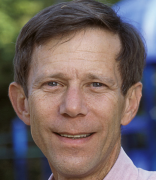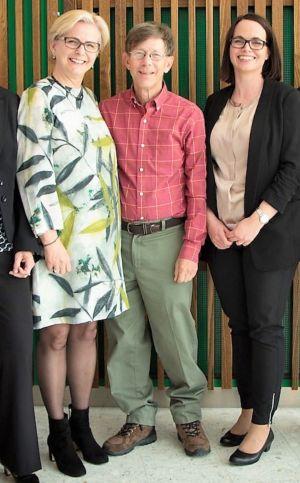One of our staff members is contributing considerably to a News Archiving service at Mu. Any well educated (Masters, PhD or above) users who wish to make comments on news sites, please contact Jim Burton directly rather than using this list, and we can work on maximising view count.
David Finkelhor

David Finkelhor is an American sociologist often cited as the major proponent (and a key founder) of sexual victimology as applied to children - playing a key role in promoting the satanic ritual abuse scare in the 90s. He holds posts as director of the Crimes against Children Research Center, Co-Director of the Family Research Laboratory and Professor of Sociology at the University of New Hampshire in the US.
Whilst Finkelhor is probably the most frequently cited research authority on what (partially due to his own advocacy) has become known as child sexual abuse, his work has been criticised by other authors such as Bruce Rind, for its poor sampling and use of morality to make broadsweeping statements about minor-adult sex.
To his credit, Finkelhor does not hide his part-reliance upon moral harm - indeed, when approached by a Prostasia Foundation moderator in 2023, he made clear that "part of the harm is the violation of a strongly supported moral principle". Finkelhor attained his PhD in 1978, and has published in six consecutive decades from the 1970s.
Career
Finkelhor has been studying child abuse, child victimization, child maltreatment and family violence since 1977. He is editor and author of 12 books and over 200 journal articles and book chapters. He has received grants from the National Institute of Mental Health, the National Center on Child Abuse and Neglect, and the US Department of Justice, and a variety of other sources. In 1994, he was given the Distinguished Child Abuse Professional Award by the American Professional Society on the Abuse of Children. In 2004 he was given the Significant Achievement Award from the Association for the Treatment of Sexual Abusers. In 2005 he and his colleagues received the Child Maltreatment Article of the Year award, and in 2007 he was elected as a Fellow of the American Society of Criminology.
Finkelhor is best known for his research on child sexual abuse. He has stated that he intends to continue his research until he proves "an unambiguous and persuasive case that the problem [of child sexual abuse] is widespread."[1] According to Kenneth Plummer, he is "probably the most prominent sociologist at work in the field [of child sexual abuse]."[2] He holds a Ph.D in sociology.
In 2007, Finkelhor addressed US Congress with a group of researchers. He agreed with the group that standard advice given to children concerning web use (not to divulge personal details) was flawed and that adult-minor sexual contacts solicited over the web rarely conform to the pathological model, and are chosen by teens themselves. Years later, this advice had still not been adopted by professionals.
Satanic ritual abuse
Between 1986 and 1988, Finkelhor worked on a large study of sexual abuse in day cares in an attempt to legitimize the satanic ritual abuse panic, including the discredited McMartin preschool case. His research was funded by a grant of $173,000 from the National Center on Child Abuse and Neglect, and the results were published in the book Nursery Crimes: Sexual Abuse in Day Care.[3] In an executive summary[4] of his findings, available online, Finkelhor writes:
- "Allegations of ritualistic abuse ("the invocation of religious, magical or supernatural symbols or activities") occured in 13% of the cases. After studying the ritualistic allegations we decided that they needed to be subdivided into three categories: 1) true cult-based ritualism, where the abuse was in service to a larger spiritual or social objective, 2) psuedo-ritualism, where the goal was primarily sexual gratification, with ritual being used only to intimidate children against disclosing, and 3) psychological ritualism, where the activities were primarily the expression of an individual's obsessional or delusional system. [...] We recommend more research and professional awareness about ritualistic child abuse. We need to know more about the prevalence, dynamics and impact of this disturbing type of abuse. Moreover, we need better information on how to effectively investigate allegations. Law enforcement, child welfare and licensing officials need to be educated about the existence of such abuse so that they can recognize it and include it in their investigations." (p. 17)
In the book, Finkelhor speculates that the motivation for ritualistic abuse may be an "identification with evil" that "ties sexual abuse to ritual abuse in the mind set that may be attracted to so-called satanic practice" (p. 64).
Moral distinction
Finkelhor's moral distinction on CSA is particularly telling, especially given his position as one of the foremost authorities on this topic:
- "Ultimately, I do continue to believe that the prohibition on adult-child sexual contact is primarily a moral issue. While empirical findings have some relevance they are not the final arbiter. [...] Some types of social relationships violate deeply held values and principles in our culture about equality and self-determination. Sex between adults and children is one of them. Evidence that certain children have positive experiences does not challenge these values, which have deep roots in our worldview."[5]
Criticism of this position continues below.
Criticism
Critics have pointed to numerous flaws in Finkelhor's research papers:
- Exclusion of data.
- Wrong conclusions.
- Importation of (flawed) moral critique: Bruce Rind argues that "Finkelhor (1979, 1984) many years ago already articulated the positions Schmidt is currently espousing. But the weakness of his articulation is instructive, as it points to the problem of trying to be a scientist and a moralist simultaneously. Like Schmidt, Finkelhor argued that harm is not needed to establish the immorality and unacceptability of adult-child sex. Instead, Finkelhor continued, the unacceptability is based on the child's inability to consent, because he does not know what he is getting into and he cannot say no. A critic then complained that, if it is true that children cannot make judgments about sex, how can they judge among rival claims of the various religious sects (e.g., agree with an adult to be taken to one church rather than another or none at all)?. Finkelhor responded that it is different with sex, because sex is more likely to be harmful. His argument is circular: the issue falls back to harm, even though harm is claimed to be unessential to the point."[6]
- Clinical focus: Finkelhor's most-cited research on the effects of child sexual abuse relies on clinical/legal samples (e.g., Kendall-Tackett, Finkelhor, et al. (1993)[7] and Finkelhor & Browne (1986)[8]), which are not representative of the general population. Studies using college or national samples report a weak to non-existent relationship between child sexual abuse and maladjustment (see Research: Prevalence of Harm and Negative Outcomes). Bruce Rind has criticized[9] this and other aspects of Kendall-Tackett, et al. (1993).
In April of 2022, Finkelhor was involved in a LibsofTikTok-enabled social media controversy following comments made in a video forum the previous month. These comments were interpreted as being sympathetic towards "predators".[10]

Personality
In his advanced years, the diminutive Finkelhor is known to walk with a zimmer frame. Students describe him as a sweet and kind old man, whose presentations are somewhat devoid of excitement. He has one child, and appears to be fond of theatrical music, having sung the opening few minutes of his acceptance speech at an award ceremony, after glowing praise from others "in the business" of child advocacy (at 14.15).[11]
From RateMyProfessors
Finkelhor has struggled somewhat in recent years as a lecturer (according to students).[12]
- "Professor Finkelhor is a very sweet and caring man. Wish people respected him more and put their phones down when he is talking. Lectures are very boring and dry however..."
- "His lectures can be boring, but he is just a little old man who is super smart and has contributed a lot to the sociology field."
- "Do not take this Course. He just talks forever and has a powerpoint with vague notes in the background. In order to actually understand what is happening you have to write down everything he says which doesn't make sense half the time & you can't hear him the other half."
- "I think he has dementia. And his TA is awful she is so unfair with anything"
- "The material is very simple, but the way he presents it in class makes it difficult to understand."
- "DON'T TAKE HIS CLAAASSS! Really, stay away. The class topic is very interesting but he will put you to sleep. Half of the time you can't understand the last 3 words of his sentences because he speaks so quietly. The videos he uses are from the 80's (at best)"
- "I can understand the comments about how boring Finkelhor can be but he knows his stuff and it can be an interesting class if you put the effort in."
References
- ↑ Child Sexual Abuse: New Theory and Research, p. 229
- ↑ Review of Child Sexual Abuse: New Theory and Research, in Contemporary Sociology, Vol. 14, No. 6. (Nov., 1985), pp. 712-713.
- ↑ Finkelhor, D., Williams, L. M., & Burns, N. (1988). Nursery Crimes: Sexual Abuse in Day Care. Newbury Park: Sage.
- ↑ Finkelhor, D., Williams, L. M., & Burns, N., & Kalinowski, M. (1988). "Sexual abuse in day care: A national study. Study prepared under grant 90-CA-1155 from the National Center on Child Abuse and Neglect." University of New Hampshire: Family Research Laboratory.
- ↑ https://www.ipce.info/ipceweb/Library/rbt_files.htm
- ↑ Rind, B., (2002) "The Problem with Consensus Morality", Review in "Peer Commentaries on Green (2002) and Schmidt (2002)", Archives of Sexual Behavior, Vol. 31, No. 6, December 2002, pp. 479 - 503
- ↑ Kendall-Tackett, K A., Williams, L. M., & Finkelhor. D. (1993). "Impact of sexual abuse on children: A review and synthesis of recent empirical studies," Psychological Bulletin, 113, 164-180.
- ↑ Finkelhor, D. & Browne, A. (1986). "Impact of child sexual abuse: a review of the research," Psychological Bulletin, 99, 66-77.
- ↑ Rind, B., Tromovitch, P., & Bauserman, R. (2001). "The validity and appropriateness of methods, analyses, and conclusions in Rind et al. (1998): A rebuttal of victimological critique from Ondersma et al. (2001) and Dallam et al. (2001).," Psychological Bulletin, 127, 748-749.
- ↑ FOX on Finkelhor controversy
- ↑ https://youtu.be/35wA0VIX8r0
- ↑ https://www.ratemyprofessors.com/ShowRatings.jsp?tid=142310
External links
- Crimes against Children Research Center
- David Finkelhor bio & curriculum vitae
- Family Research Laboratory
- Finkelhor addresses Congress
- Finkelhor's Flaws - Criticism from Stephen James for Uncommon Sense (defunct).